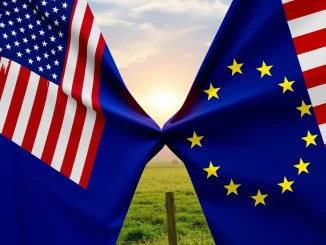
While the world of cryptocurrency often feels separate from traditional government actions, decisions made regarding national economic powers can have ripple effects that eventually touch digital assets. A recent development from a US appeals court highlights just such a scenario, potentially influencing the broader economic landscape.
What Did the US Appeals Court Decide on Government Tariff Authority?
According to a report from @solidintel_x on X, a federal appeals court has issued a significant trade ruling. The court upheld the U.S. government’s inherent authority to impose tariffs. This decision is particularly noteworthy because it overturns a previous ruling by the U.S. Court of International Trade.
The overturned ruling had specifically targeted a reciprocal tariff order issued by former President Trump on April 2, deeming it to have exceeded the scope of presidential powers granted under the International Emergency Economic Powers Act (IEEPA).
Understanding the IEEPA and Presidential Powers
The International Emergency Economic Powers Act (IEEPA) is a federal law that grants the President the authority to regulate commerce after declaring a national emergency in response to any unusual and extraordinary threat, which has its source in whole or substantial part outside the United United States, to the national security, foreign policy, or economy of the United States.
The prior ruling from the Court of International Trade suggested that Trump’s specific tariff action under IEEPA went too far. However, the US appeals court has now disagreed, affirming that the executive branch does possess the authority exercised in that instance. This reinforces the government’s ability to use tariffs as a tool under specific statutory powers like the IEEPA.
Implications of the Government Tariff Authority Ruling
This decision is a win for executive authority in trade matters. It clarifies and strengthens the ability of the President to impose tariffs under specific legal frameworks like IEEPA, provided the conditions for invoking such powers are met.
While not directly about Bitcoin or blockchain, such rulings contribute to the overall economic climate and regulatory predictability (or unpredictability). Changes in trade policy can affect global supply chains, inflation, and international relations, all of which can indirectly influence investor sentiment across all asset classes, including cryptocurrencies.
The upholding of this government tariff authority means that future administrations may feel more empowered to use similar measures in response to perceived economic threats, relying on the precedent set by this trade ruling.
What This Means for the Broader Economic Picture
This court decision reinforces the executive branch’s significant leverage in trade negotiations and disputes. It underscores the legal backing for using tariffs as a policy instrument. For those in the crypto space, while the link isn’t direct, it’s another piece of the complex global economic puzzle that can influence market dynamics. Monitoring such significant legal and economic rulings remains important for understanding the wider forces at play.
In Conclusion: Affirming Executive Power
The US appeals court has decisively upheld the government’s authority to impose tariffs, overturning a prior ruling that questioned the extent of presidential powers under the IEEPA. This key trade ruling solidifies the executive branch’s position on using tariffs as a tool. While the immediate impact on crypto is indirect, such macroeconomic and legal developments are crucial indicators of the broader economic environment that influences all markets.



